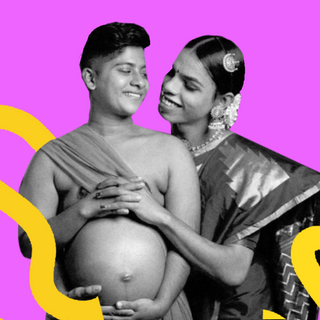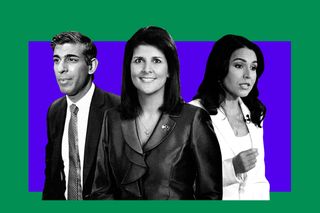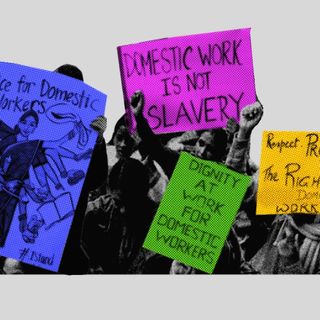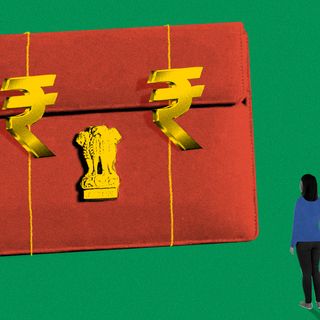
Nikki Haley Is Running for US President – Signaling the Conservative Indian Diaspora’s Rising Power
The rise of conservatism among Indian-Americans in the West reflects voting patterns based on a parallel rise in Hindu nationalism.

Indian-American politician Nikki Haley announced herself as a candidate for the role of US President in 2024. Haley is a candidate from the Republican party, whose ideologies are rooted in American conservatism. Her candidacy — alongside that of Bobby Jindal, another Indian-American candidate, in the past — signals the growing power of the conservative Indian diaspora in the West.
Haley’s announcement — much like that of conservative politician Rishi Sunak’s rise to power in the UK as its first Prime Minister of color — is being widely covered by Indian media. Given how the rise of Sunak — an upper-class, British citizen with Indian roots — was celebrated in the country, despite his rather nebulous ties to India, it is likely that Haley’s candidacy will be met with equally misplaced fervor.
“Indians get excited, sometimes inordinately, every time someone with an ‘Indian’ connection rises to a position of prominence. Often that link with India is tenuous, but that does not stop those who immediately want to claim the person as one of their own,” The Wire opined in 2022.
The rise of conservatism among the Indian diaspora then signals a shift in conversations about representation — often, the politicians in question are icons of diversity who also become faces of the global conservative shift. This isn’t just restricted to those in positions of power; it diaspora Indian voters as well. “There are certainly a smaller number of Indian-Americans who align with the Republican Party… And that number is likely growing somewhat, as the conservative, Hindu nationalist movement in India gains more steam,” noted Sara Sidhwani, an assistant professor of politics at Pomona College who specializes in Asian-American voting behavior and representation. According to Sidhwani, the rise of the BJP — a right-wing party — in India, has inspired a surge in conservatism among Indian-Americans, too.
In fact, in 2019, Scroll noted that the BJP leveraged its “impressive Hindu diaspora network to influence politics in UK, US, and Canada.” The record crowds drawn by Indian Prime Minister Narendra Modi at New York’s Madison Square Garden in 2014, and Houston, Texas, again, in 2019, amid resounding cheers from the audience, attests to this.
Related on The Swaddle:
The Ironic Appreciation of ‘Indian Matchmaking’ Signals an Ideological Blind Spot
Further, a number of Democratic politicians have criticized certain moves by India’s ruling party, leading Indian-Americans to actively lend their support to the Republicans, says Sangay Mishra, associate professor of political science at Drew University, and author of Desis Divided: The Political Lives of South Asian Americans. “[Conservative Indian voters] are saying that Trump is good for India because Trump would not interfere [i]n Kashmir, nor would he criticize India on CAA or other human rights violations.”
The implications of this shift are worrying. Tulsi Gabbard, a Hindu American and former a member of the Democratic party — known for its liberal politics — recently quit. Although she isn’t Indian, she enjoys a sizeable Indian following due to her religion. In her “second act as a right-leaning ‘independent,'” who caters to “a mostly conservative audience,” Gabbard has become a paid contributor to Fox News, America’s leading right-wing conservative media. The switch in her political ideology — from being a Democrat to introducing anti-abortion bills — speaks to the shift in the Indian diaspora’s politics in the West.
Gabbard would then be joining a group of more openly conservative Indian diaspora politicians like Priti Patel — a member of the Conservative Party in the UK — whose anti-immigration stance threatens to jeopardize the prospects of Indians seeking to move abroad. Described as “cruel, inhumane, and deeply flawed,” Patel’s policies have been criticized for their potential to further deprive already vulnerable populations. Even Sunak and Suella Braverman (home secretary of the UK in Rishi Sunak’s cabinet) have expressed their anti-immigration positions, in the past. This is despite the trio being immigrants themselves — revealing, on their part, an intent to gatekeep the privileges they have grown up with from Indian populations.
Commenting on Braverman’s politics, The Guardian opined last October: “Braverman thanked Priti Patel for the ‘foundations’ she had laid in toughening the immigration system, invoking the usual specters of ‘illegal immigrants,’ ‘low-skilled foreign workers,’ and ‘mass and rapid migration.’ But she made it clear that she would go further, with plans to bring in the harshest, most damaging immigration environment yet.”
With Indians routinely subjected to racism abroad, our exaltation at the rise of politicians from the Indian diaspora raises the question: what’s there to celebrate, really?
Note: A previous version of this article incorrectly stated that Tulsi Gabbard is Indian-American. The article has been updated.
Devrupa Rakshit is an Associate Editor at The Swaddle. She is a lawyer by education, a poet by accident, a painter by shaukh, and autistic by birth. You can find her on Instagram @devruparakshit.
Related


17 Year‑Old Domestic Worker Alleges Severe Abuse by Gurgaon Employers. Why Is Domestic Work Still Such a Vulnerable Profession in India?
